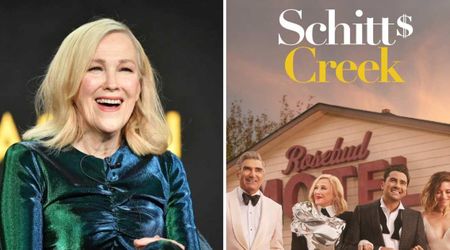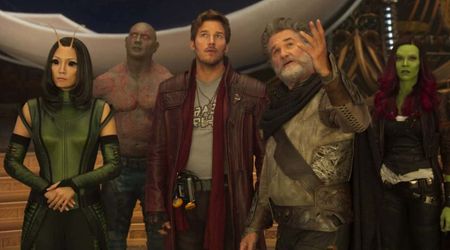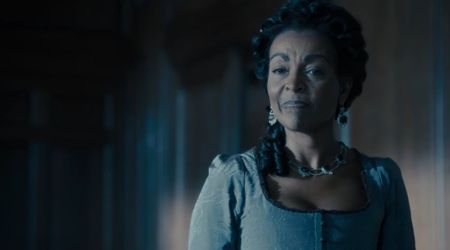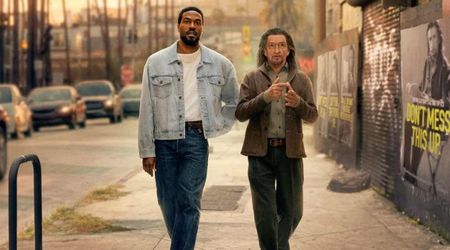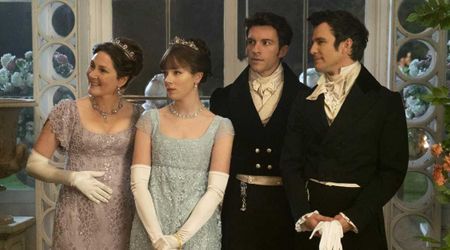'On Becoming a God in Central Florida' aims at exposing the 'American dream' scam but gets sidetracked by its quirkiness

Between the jarring 90s aesthetic, the farcical, the surreal, and Florida's weirdness, it is easy to get distracted from the beating heart of 'On Becoming a God in Central Florida'. It is also easy to get distracted from the working-class and non-white migrants trying to reconcile their hand-to-mouth existence with the promise of the American Dream. The Dream, born from the myth of the endlessly expanding American Frontier, is the promise that people who work hard can and will get ahead. In 1980, concerns about the Dream's decline kickstarted the Reagan era of neoliberal capitalism. By the 90s, the prosperity of a few 'winners' allowed the collective American Dream to survive. But the majority of working-class, black or marginalized Americans became the 'losers' who would only win if they knew the system was rigged and knew how to beat it. Mostly by foul means because fair means were few and far between.
Garbeau the Second (Ted Levine), the fictional FAM's founder uses the power of the Dream, referencing the "Wild West", "the land of millionaires" and of "opportunities that geysers up from the ground like oil bursting to touch the heavens" in his promotional tapes. He uses the scam that is the American Dream to power his more modest-sized multi-level marketing (MLM) scam in Florida.

In one 'Garbeau system' tape, he chants, "What if I won the lottery, what if I dated the prom queen...A winner doesn't say 'what if'. A winner says 'when I'. Because 'what if' is a pipe dream, 'when I' is a promise. You give me your pipe dreams and I'll make you a promise...I'll give you the world." Sara Ahmed, in her book 'The Promise of Happiness', suggests that people follow certain scripts or narratives, embedded in cultural norms, to pursue happiness. They chase the positive 'affect' generated by "happy objects", like an expensive car or a big house; objects that gather the charge of positive associations because they are valued within a culture. Garbeau, who embodies a certain lifestyle, is also a 'happy object' in 'On Becoming...'
Normative 'happiness scripts' directs us, telling us which 'happy objects' to pursue. It makes certain ways of living more valuable than others, creating the "unhappy queer", the "killjoy feminist", and the "melancholy migrant". The ones whose idea of happiness is different from what is endorsed by the dominant culture. To Ahmed, happiness is a mechanism of discipline or governance that fosters oppression and inequality. The happiness script of "living the good life" is what Garbeau and other upliners use to sell the FAM scam. Revealing the exploitative nature of FAM 'positivity', Carol Wilkes (Julie Benz) emphasizes the need to keep the 'FAM downline' motivated because, without them, there is "more work and no honey".
Travis Stubbs (Alexander Skarsgard) is obsessed with the good life. He is ready to go without sleep, spend nights recruiting and spend very little time with his family to achieve it. He is also poorer, living more precariously as an "independent business owner". He is unhappier because he is trying to achieve happiness. Similar to how in an interview about her book 'Cruel Optimism', Lauren Berlant gives the analogy of a "destructive love affair" that a person doesn't end because of what's invested in terms of hopes or fantasies. It is about the promise of future happiness even though all evidence points to the contrary. It explains why, as Berlant says, "when precariousness is spread throughout the world, people fear giving up on the institutions that have worn out their confidence in living."
So as we get more desperate, we get more invested in free-market policies, in deregulation, in demanding cutbacks on social welfare, despite seeing the rise of inequality, boom-and-bust cycles, anemic growth and the failure of institutions "too big to fail". Why then are FAM-fanatics, like Travis, portrayed as gullible hicks for continuing to invest in FAM?

By depicting Travis, Cody (Théodore Pellerin) and other FAM-ers as immature suckers, the writers miss the opportunity to let us identify with them. We don't have the realization that we are all susceptible to our own versions of a 'happiness script'. It could be the heteronormative idea of a 'happy family', or "caviar for breakfast, Kobe beef for lunch" in Garbeau-speak. It could be a 'get rich quick' MLM scheme in a no-name town with no opportunities. It could be the lure of better interest rates for overvalued mortgage-backed securities before the 2008 crash.
Kirsten Dunst, who plays Krystal Stubbs, said FAM was like Instagram 'influencers' in 2019. Beauty or fashion gurus (with fabulous online lives) are 'happy objects' and their social media marketing and successful endorsements depend on their followers having positive associations. But the relevance of this 'affect economy' is lost because the show is set in the 90s, removed from our current reality. All we get is Krystal with her on-point rage - the source of well-earned humor. She is the "stinker thinker" dead set against FAM happiness and the patriarchal bullshit heaped on top of her misfortunes. Her 'happiness', providing for her baby, is not illusory.
Krystal is very aware that FAM is a scam and blames it with bitterness in episode 2 for her husband's death. But as her well-thought-out proposals to earn that little extra to provide for her daughter, are shot down by the men around her, she finds herself desperate, on the verge of losing her house. The only option she is left with is the line Cody holds out to her in the form of an "upline advance" to convince her to take Travis's place in the FAM pyramid. She has to invest herself in FAM and fake her optimism in it because she has no choice. Like many working-class Americans with little to no alternatives. You might hate Walmart's low wages but what can you do if it is the only place to work?
But instead of deriving the dark comedy from these realities, the show's writers use farcical encounters like the one between Cody and Pat Stanley (Josh Fadem), a rival agent of a FAM-like MLM organization. They also use juvenile and on-the-nose humor around the names of people and places. The Garbeau system could easily be the Garbage system; Cody Boner, pronounced 'bonAR', frequently is called Boner, while the FAM convention attendees who are big on 'FAMily values go on a retreat to 'Paradise Gay'. The only enjoyable moments come when Stan and Krystal go head to head or when Bets sparks sweet and funny interactions with Ernie. But overall, the garishness of the 90s aesthetic and the emphasis on Florida's weirdness implies you are watching 'crazy' people.
The series could have been the working-class POV on American capitalism and forms a perfect triage along with 'Succession' (that looks at Capitalism and Corporate Media) and the 'The Righteous Gemstones' that examines the intersection between American Christianity and American capitalism. But alas, for now, we will take what we can get. Even if it is in acid-wash shorts.


